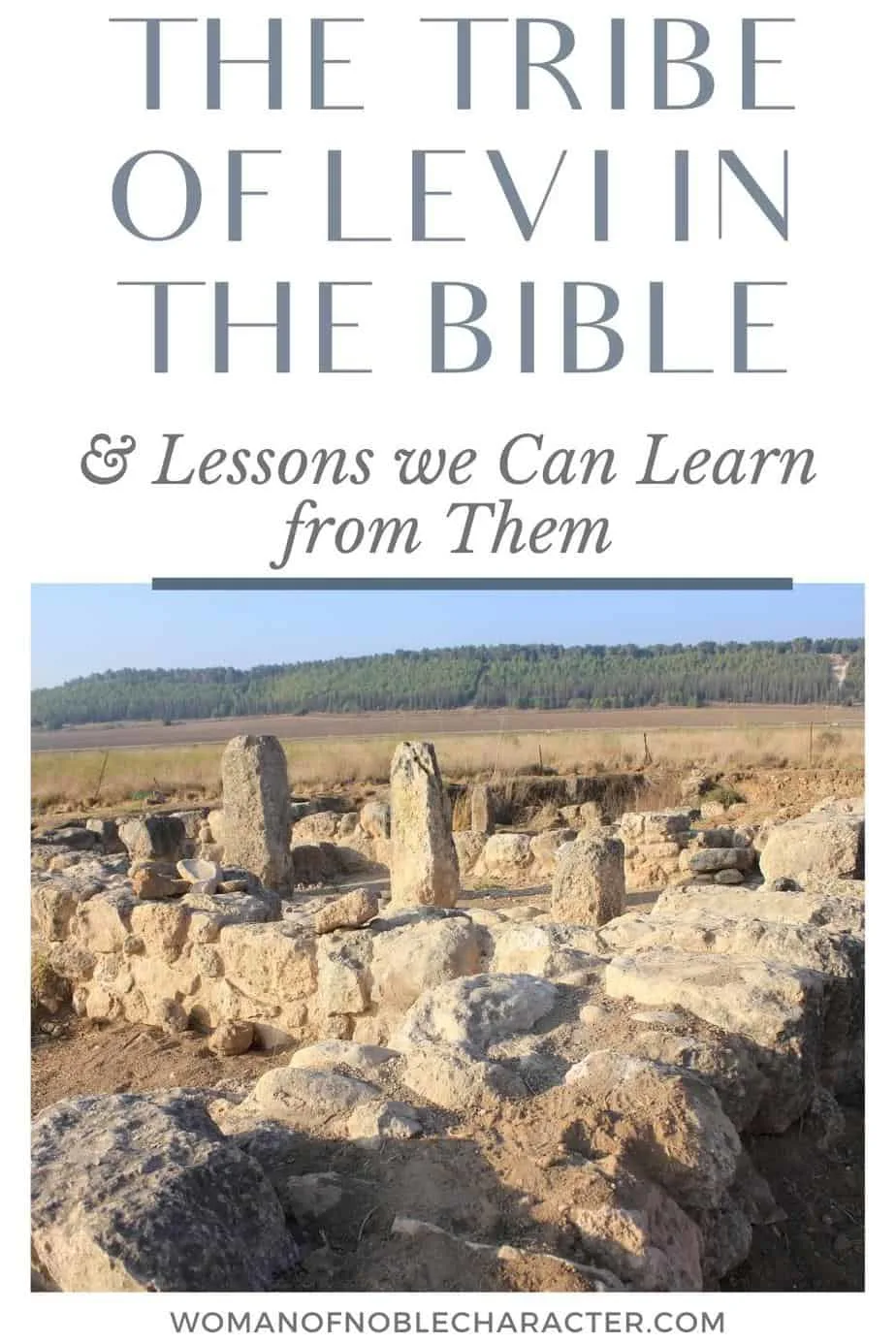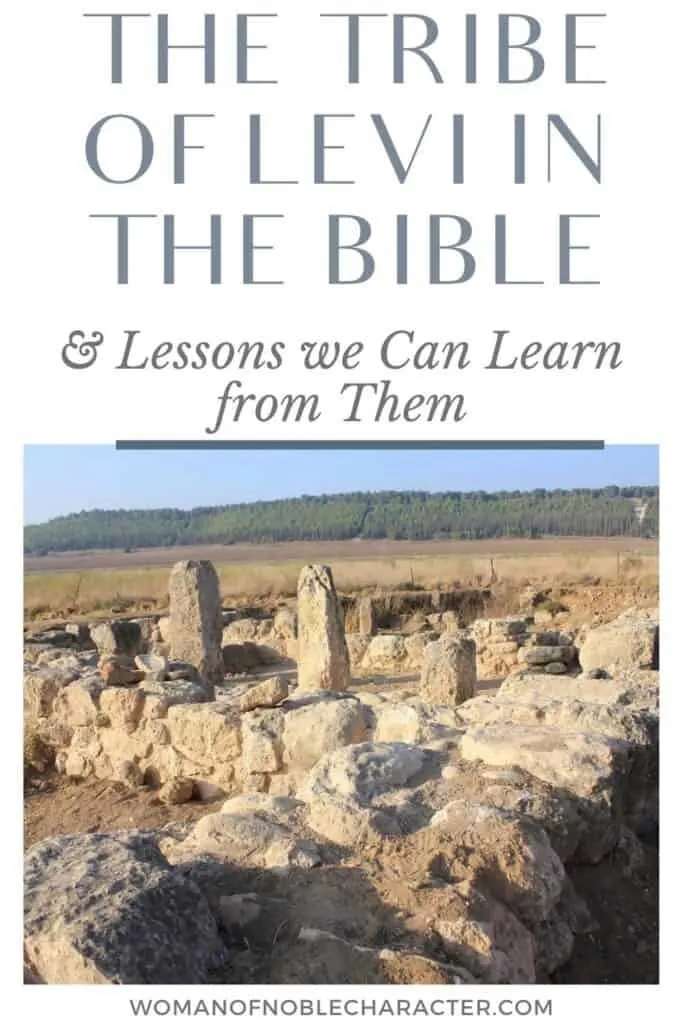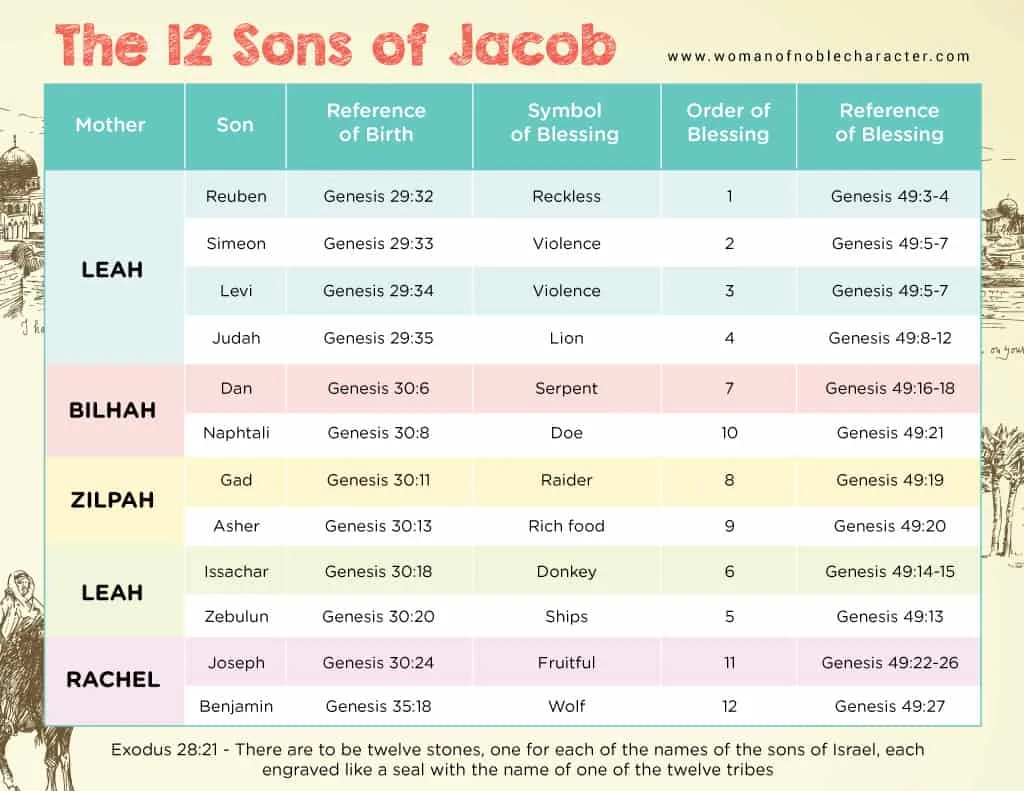This page/post may contain affiliate links. As an Amazon Associate, as well as an affiliate of other programs, this means if you purchase something using these links, I will receive a commission on qualifying purchases at no cost to you! For more detailed information, please visit our Affiliate Disclaimer page
Continuing our series on the Twelve Tribes of Israel (We have previously shared the Tribe of Reuben and the Tribe of Simeon), today, we turn our attention to the Tribe of Levi, often considered the “chosen tribe” You can find other tribes here: the Tribe of Reuben, The Tribe of Simeon, the Tribe of Judah, the Tribe of Dan, the Tribe of Naphtali, Tribe of Gad, Tribe of Joseph, Tribe of Asher, Tribe of Issachar)

Who was Levi in the Bible?
Levi, the third-born son to Jacob, was mothered by Leah, and was the founder of the Israelite Tribe of Levi (the Levites) as well as the grandfather of Aaron and Moses. His birth is recorded in Genesis 29:34.
Again she conceived and bore a son, and said, “Now this time my husband will be attached to me, because I have borne him three sons.” Therefore his name was called Levi.
Genesis 29:34 (ESV)
Levi translates as “joined.” In the sense, Leah felt joined to Jacob now, so the tribe of Levi would become joined to God, set aside as His tribe. Levi was mentioned briefly in the narrative concerning the 12 sons of Jacob. He is most known for his joint attack on Shechem with his brother Simeon.
Why Was the Tribe of Levi Chosen?
In God’s original plan, the firstborn sons were to have been set apart as priests. When the Lord spared the Jewish firstborns in Egypt, He designated them for this special role. Unfortunately, when the Israelites created and worshipped the golden calf after the giving of the Torah on Mount Sinai, the only tribe that did not participate was the Tribe of Levi. It was then, that the firstborn sons lost their set-apart status, and it was transferred to the Levites.
“At that time the Lord set apart the tribe of Levi to carry the ark of the covenant of the Lord to stand before the Lord to minister to him and to bless in his name, to this day.”
Deuteronomy 10: 8 (ESV)
The Levites had been designated as “special” even before that, though. During the bondage by the Egyptians, they were excepted from hard labor and allowed to devote themselves to spiritual pursuits, which helped the other Hebrews and tribes by providing encouragement and a strong example.
CLICK ON THE IMAGE BELOW FOR A DOWNLOADABLE, PRINTABLE PDF OF THE 12 SONS OF JACOB
The Tribe of Levi Territory?
Unlike the other tribes, the tribe of Levi was the only tribe of Israel that did not receive a territory of land from God. Numbers 3 reiterates, God’s commandments concerning the Tribe of Levi to Moses.
And the Lord spoke to Moses, saying, “Behold, I have taken the Levites from among the people of Israel instead of every firstborn who opens the womb among the people of Israel. The Levites shall be mine, for all the firstborn are mine. On the day that I struck down all the firstborn in the land of Egypt, I consecrated for my own all the firstborn in Israel, both of man and of beast. They shall be mine: I am the Lord.”
Numbers 3: 11-13 (ESV)
But he goes on in a later verse to share his intentions:
And the Lord said to Moses, “List all the firstborn males of the people of Israel, from a month old and upward, taking the number of their names. And you shall take the Levites for me—I am the Lord—instead of all the firstborn among the people of Israel, and the cattle of the Levites instead of all the firstborn among the cattle of the people of Israel.”
Numbers 3:40-41 (ESV)
It is interesting to note that in both sections of scripture, God ends by reminding Moses that He is the Lord, showing that His command is final.
Of course, throughout the Old Testament, God required blood sacrifices to atone for the sins of the Israelites. We know that because of Pharaoh, his stubbornness, and his hard heart, God allowed all firstborn males in Egypt to die. Pharaoh’s hardheadedness and refusal to let the Hebrews go compelled God to demonstrate to Pharaoh His strength and power.
So, the tribe of Levi became the sacrifice of thanksgiving for God delivering the Hebrews to safety. In exchange for the firstborn males and livestock, God took the Levites as a sacrifice for Himself and dedicated the Tribe of Levi to serve Him.
So, now we know why the Levites were set apart, but why did they not receive an allotment of land or territory? Simple, their service to the Lord would require them to live and travel throughout all of Canaan. They were to serve and minister to the Lord’s instruction and carry out the required sacrifices for all the 12 tribes of Israel. If they were limited to one territory, they would not be able to effectively carry out their service to the Lord. Instead, God assigned cities to the Levites they were to live in to carry out their priestly duties. These cities were spread throughout the land of Canaan and surrounded every tribe and region. A full list of the cities designated by God for the Levites to live in can be found in Joshua 21.
A bit later, we learn of a birth that would change history. The birth of Moses. Both his father, Amram, and his mother were Levites making him pure Levitical blood.
Levi in the Bible: Murder and Deceit
Scripture mentions one daughter of Jacob, named Dinah. While she is not a prominent figure, she does play a short, but pivotal role in biblical history.
In Genesis 34, we read that she was out visiting some Canaanite women and was raped by Shechem, the son of the chief in the area, Hamor. Shechem claims to have fallen in love with Dinah and her beauty and asks his father to approach Jacob with the hopes of marrying her. Hamor tells Jacob to set any bride price he wished and for there to be peace between them. Neither Shechem nor Hamor seem to have no repentance for his crime!
Jacob, clearly distraught, as any father would be, said nothing until his sons returned from the fields. When Jacob’s sons learn of what happened, they are angry and upset, naturally. It is interesting to note, here, that scripture says that “Jacob’s sons” conspire together, but that no one brother was called out as leading the revenge and that Jacob was mainly silent. (He was probably in shock!) So, what did they conspire to do? They deceived Shechem and his father by agreeing to allow Dinah to marry Shechem if all the men in the city of Shechem are circumcised. Shockingly, the men of Shechem agree to this, and all the men in the city were circumcised. Now, this is where it really gets interesting.
“On the third day, when they were sore, two of the sons of Jacob, Simeon and Levi, Dinah’s brothers, took their swords and came against the city while it felt secure and killed all the males. They killed Hamor and his son Shechem with the sword and took Dinah out of Shechem’s house and went away. The sons of Jacob came upon the slain and plundered the city, because they had defiled their sister. They took their flocks and their herds, their donkeys, and whatever was in the city and in the field. All their wealth, all their little ones and their wives, all that was in the houses, they captured and plundered”
Genesis 34:25-29 (ESV)
Jacob was beside himself about this situation and said to Simeon and Levi:
“Then Jacob said to Simeon and Levi, “You have brought trouble on me by making me stink to the inhabitants of the land, the Canaanites and the Perizzites. My numbers are few, and if they gather themselves against me and attack me, I shall be destroyed, both I and my household.”
Genesis 34:30 (ESV)
God instructed Jacob to move the family further south, to Bethel. In addition, Levi was not mentioned by name in the conspiracy to kill Joseph, he did readily go along with the plan of his brothers. Ultimately, Reuben swayed their minds from murder, making Levi guilty of harming his own family member. It may be due to these incidents that Jacob’s “blessing” was so harsh:
“Simeon and Levi are brothers;
Genesis 49:5-7 (ESV)
weapons of violence are their swords.
Let my soul come not into their council;
O my glory, be not joined to their company.
For in their anger they killed men,
and in their willfulness they hamstrung oxen.
Cursed be their anger, for it is fierce,
and their wrath, for it is cruel!
I will divide them in Jacob
and scatter them in Israel.
From this point, scripture references about Levi mainly focus on his sons. We do know that in Genesis 46:11, Levi went to Egypt with his three sons; Gershon, Kohath, and Merari. During the time of Exodus, the Israelites grew greatly in number, and it was during this time that the tribe of Levi would rise to its known prominence. Through service to the Lord, they would right the wrongs of Levi, and their faithfulness to God would be noticed and rewarded.
What Lessons Can We Learn From Levi in the Bible?
We Are Never Too Far Gone for God to Use Us
Levi plotted, murdered, and acted in revenge, yet no matter the sin, Levi’s tribe was rewarded for their eventual obedience, and God worked out all things for good. You have never sinned too much or have been too far gone from God for Him to work in you and use you for His Kingdom.
You have never sinned too much or have been too far gone from God for Him to work in you and use you for His Kingdom.
Anger Can Leave a Wake of Devastation
Anger can be a catapult to sin. Anger can cause us to do or say things that leave long-lasting consequences. And we should never take counsel from angry people. They are thinking with their emotions rather than logic or biblical truth. Jacob said, in his “blessing,” “They use their weapons to commit violence. I will not join in their secret talks, Nor will I take part in their meetings, For they killed people in anger.”
Self-control is a fruit of the Spirit. No matter how angry we become at someone, we are to exhibit self-control and respond in a loving way – no matter how our emotions are trying to direct us. Always pray about your response first.
Grumbling and Complaining Can be Harmful
The deception of sins like these is that they seem harmless. However, as with all sin – a closer examination reveals them for what they really are: an active rebellion against God and unrest in one’s heart and in the hearts of those around us.
But each person is tempted when he is lured and enticed by his own desire. Then desire when it has conceived gives birth to sin, and sin when it is fully grown brings forth death.
James 1:14-15 (ESV)
Korah’s sin caused him to be dissatisfied with God’s chosen leaders, which then led to others who opposed them. We must remember that if we choose prideful anger in our hearts and sow it into those around us–we will certainly face responsibility for what happens, but other people may also suffer consequences of this sort too!
Do not be deceived: God is not mocked, for whatever one sows, that will he also reap.
Galatians 6:7 (ESV)
The form you have selected does not exist.
Pride Leads to Spiritual Blindness and Rejection of God’s Truth.
This should go without saying, but pride can be a tricky thing, and pride in life is not from God. It may not always have the same flavor as you think it does, and sometimes even seemingly honorable reasons are masking something more serious or malicious in nature.
Do not love the world or the things in the world. If anyone loves the world, the love of the Father is not in him. For all that is in the world—the desires of the flesh and the desires of the eyes and pride of life—is not from the Father but is from the world. And the world is passing away along with its desires, but whoever does the will of God abides forever.
1 John 2:15-17 (ESV)
Korah’s complaint against Moses and Aaron was rooted in his belief that because the entire nation of Israel was considered holy, then no one should be seen as more exalted than anyone else. They even go as far as using God’s very name and presence to support their grievances.
They assembled themselves together against Moses and against Aaron and said to them, “You have gone too far! For all in the congregation are holy, every one of them, and the Lord is among them. Why then do you exalt yourselves above the assembly of the Lord?”
Numbers 16:3 (ESV)
Korah’s pretense was soon revealed as selfish ambition. His prideful and arrogant living resulted in twisting God’s Word for his benefit, thus rejecting the need for a godly connection with Him; this has led him on an unproductive path where he placed all glory onto himself – there is no blessing found within such vain endeavors!
Heedlessly following empty desires will only lead you astray from what true faith means: humility before Almighty God, who lifts up those whose hearts are wholly given over to Him.
But he gives more grace. Therefore it says, “God opposes the proud but gives grace to the humble.”
James 4:6 (ESV)
Toward the scorners he is scornful,
Proverbs 3:34 (ESV)
but to the humble he gives favor.
What do you think about the tribe of Levi and their prominence in biblical history despite their shortcomings? What lessons do you take away from their story? I’d love to hear your thoughts!
If you would like to learn more about the tribe of Levi or its history, consider one of these recommended resources:
The 12 Tribes of Israel (or is it 14?) & Lessons We Can Learn by Susan J Nelson
The History of the Tribe of Levi Considered
The Study of The Twelve Tribes of Israel by Rev. Derrick A Hill
Because He Lives,
Sue
ESV – “Scripture quotations are from The ESV® Bible (The Holy Bible, English Standard Version®), copyright © 2001 by Crossway, a publishing ministry of Good News Publishers. Used by permission. All rights reserved.”


